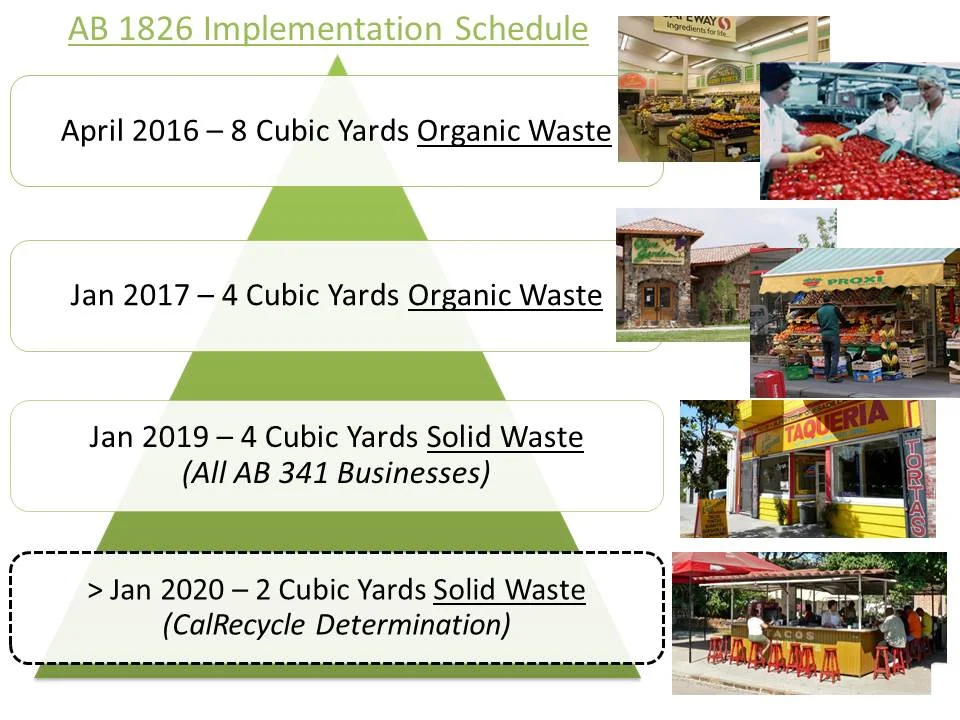Implementation of AB 1826: Statewide Organics Recycling
AB 1826 targets the lowest hanging fruit of the organic waste stream—the material thrown away by the state’s businesses. Restaurants, super markets, large venues, and food processors generate significant quantities of high quality food waste, and several states have already prohibited the disposal of this material. The bill lays out a measured phase-in of a commercial organics recycling program that will ensure that private sector can build the infrastructure necessary to handle the material.
AB 1826 builds on the success of the mandatory commercial recycling program established by AB 341. Beginning with the largest generators of food waste in 2016 and ramping down to the vast majority of businesses over several years, AB 1826 bill will require businesses to sign up for organics recycling service.
AB 1826 Timeline
- January 1, 2016: Local jurisdictions shall have an organic waste recycling program in place. Jurisdictions shall conduct outreach and education to inform businesses how to recycle organic waste in the jurisdiction, as well as monitoring to identify those not recycling and to notify them of the law and how to comply.
- April 1, 2016: Businesses that generate 8 cubic yards of organic waste per week shall arrange for organic waste recycling services.
- January 1, 2017: Businesses that generate 4 cubic yards of organic waste per week shall arrange for organic waste recycling services.
- August 1, 2017 and Ongoing: Jurisdictions shall provide information about their organic waste recycling program implementation in the annual report submitted to CalRecycle. (See above for description of information to be provided.)
- Fall 2018: After receipt of the 2016 annual reports submitted on August 1, 2017, CalRecycle shall conduct its formal review of those jurisdictions that are on a two-year review cycle.
- January 1, 2019: Businesses that generate 4 cubic yards or more of commercial solid waste per week shall arrange for organic waste recycling services.
- Fall 2020: After receipt of the 2019 annual reports submitted on August 1, 2020, CalRecycle shall conduct its formal review of all jurisdictions.
- Summer/Fall 2021: If CalRecycle determines that the statewide disposal of organic waste in 2020 has not been reduced by 50 percent of the level of disposal during 2014, the organic recycling requirements on businesses will expand to cover businesses that generate 2 cubic yards or more of commercial solid waste per week. Additionally, certain exemptions may no longer be available if this target is not met.
Background & Overview
In October 2014 Governor Brown signed AB 1826, a CAW sponsored bill, by Assemblymember Chesbro, requiring businesses to recycle their organic waste on and after April 1, 2016, depending on the amount of waste they generate per week. This law also requires that on and after January 1, 2016, local jurisdictions across the state implement an organic waste recycling program to divert organic waste generated by businesses, including multifamily residential dwellings that consist of five or more units (please note, however, that multifamily dwellings are not required to have a food waste diversion program). Organic waste (also referred to as organics throughout this resource) means food waste, green waste, landscape and pruning waste, nonhazardous wood waste, and food-soiled paper waste that is mixed in with food waste. This law phases in the mandatory recycling of commercial organics over time, while also offering an exemption process for rural counties. In particular, the minimum threshold of organic waste generation by businesses decreases over time, which means an increasingly greater proportion of the commercial sector will be required to comply.
Click here for CalRecycle: Mandatory Commercial Organics Recycling


